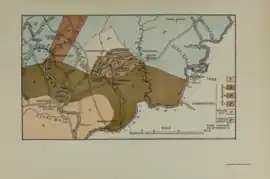
The Canonbie Coalfield is a small and largely concealed coalfield at Canonbie in the south of Scotland. A comprehensive survey by Peach and Horne was published in 1903.[1] Canonbie colliery was worked until 1920, and another mine at Archerbeck continued until 1942.[2]
Recent work has indicated potentially economically workable reserves beneath a cover of New Red Sandstone rocks.[3][4][5]
The following coal seams occur within the Pennine Middle Coal Measures Formation in this coalfield:[6]
- Knottyholm
- Archerbeck
- Six Foot
- Nine Foot
- Five Foot
- Eight Foot
- Seven Foot
Further less important seams lie within the underlying Pennine Lower Coal Measures Formation and within the overlying strata of the Pennine Upper Coal Measures Formation and the Warwickshire Group including the 'High Coal' at the base of the latter.
New Proposal
In 2014, New Age Exploration Limited proposed a new coal mine in the Canonbie area. They estimated that the new mine could operate for 26 years and yield 1.4 million tonnes of coal per annum. The emphasis was upon Coking coal as opposed to power station coal which would be a prime market in the UK and EU.[7][8]
References
- 1 2 Peach, B.N.; Horne, J. (1903). "The Canonbie Coalfeld: its geological structure and relations to the carboniferous rocks of the North of England and Central Scotland". Transactions of the Royal Society of Edinburgh. 40.
- ↑ "Canonbie Coalfield". Northern Mine Research Society.
- ↑ Picken, G. S. (1 June 1988). "The concealed coalfield at Canonbie: an interpretation based on boreholes and seismic surveys". Scottish Journal of Geology. 24 (1): 61–71. doi:10.1144/sjg24010061. ISSN 0036-9276.
- ↑ British Geological Survey 2007 Bedrock geology: UK North 1:625,000 scale geological map, BGS, Keyworth, Notts
- ↑ National Archives (UK)
- ↑ Stone P. et al. 2010. British Regional Geology: Northern England (5th Edn), (Keyworth, Notts, British Geological Survey)
- ↑ "Lochinvar | New Age Exploration Ltd". nae.net.au. Retrieved 24 October 2015.
- ↑ Leroux, Marcus (17 November 2014). "Old King Coal Makes a Comeback" – via The Times.
55°04′43″N 2°57′10″W / 55.0787°N 2.9528°W